人教版高中英语必修四期末考试试题.docx
人教版高中英语必修四高一下学期期末考试英语试题-(18).docx
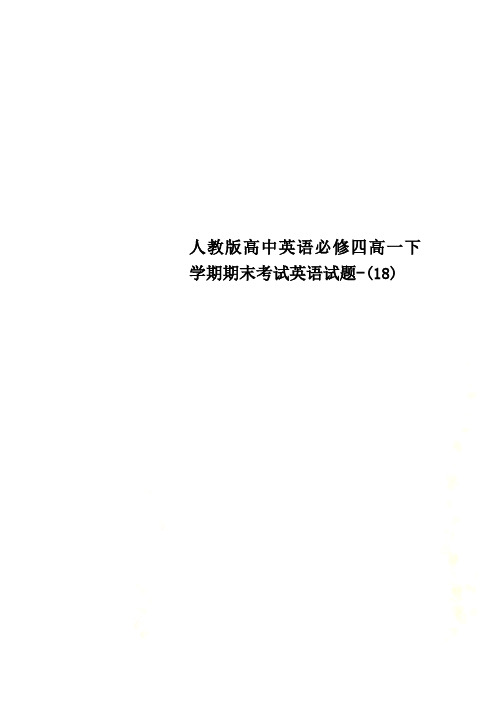
人教版高中英语必修四高一下学期期末考试英语试题-(18)高中英语学习材料madeofjingetieji南昌十九中2014~2015学年度第二学期高一年级期末考试英语试题第I卷(选择题,满分110分)第一部分听力(共两节,满分30分)做题时,先将答案标在试卷上。
录音内容结束后,你将有两分钟的时间将试卷上的答案转涂到答题卡上。
第一节(共5小题;每小题1.5分,满分7.5分)听下面5段对话。
每段对话后有一个小题,从题中所给的A、B、C三个选项中选出最佳选项,并标在试卷的相应位置。
听完每段对话后,你都有10称钟的时间来回答有关小题如阅读下一小题。
每段对话仅读一遍。
1.What does the woman want to do ?A.Find a place.B. Buy a map.C.Ge an address.2.What subject does the man like best?A. HistoryB.BiologyC.Chemistry.3.What does the man want to do?A.Take photosB.Buy a cameraC.Help the woman.4.What will the man buy?A.VegetablesB.Meat.C.Bread.5.Where does this conversation probably take place?A. In a bookB. In a classroomC.In a library.第二节(共15小题;每小题1.5分,满分22.5分)听下面5段对话或独白。
每段对话或独白后有几个小题,从题中所给的A、B、C三个选项中选出最佳选项,并标在试卷的相应位置。
听每段对话或独白前,你将有时间阅读各个小题,每小题5秒钟;听完后,各小题将给出5秒钟的作答时间。
每段对话或独白读两遍。
听第6段材料,回答第6至7题。
6. When will the woman go to see the movie?A. Friday.B. SaturdayC. Sunday.7. Where will the woman sit for the movie?A. In the front .B.In the middle .C. At the back.听第7段材料,回答第8 至10题。
人教版高中英语必修四期末考试.doc

高中英语学习材料***鼎尚图文理制作***兰州一中2010—2011―Ⅱ学年期末考试高一英语本试卷分第一卷(选择题)和第二卷(非选择题)两部分,共120分。
考试时间110分钟。
考生注意:1. 请将第一卷所选答案填在答题页上。
2. 填写班级时请用阿伯数字如:14Ⅰ. 听力(共20题,每小题1分,满分20分)第一节:听下面5段对话,选出最佳选项。
每段对话仅读一遍。
1. What is the man going to do tonight?A. Go to the cinema.B. Attend a meeting.C. Watch TV at home.2. Where does the conversation take place?A. In a shop.B. In a museum.C. In a restaurant.3. What time will the speakers get to Beijing?A. At 11:00.B. At 12:30.C. 12:45.4. Is the man going to the party?A. No.B. Sure.C. Maybe.5. What dose the woman ask the man to do?A. Tell her what the problem is.B. Repair the computer for her.C. Send someone to help her.第二节:听下面5段对话或独白,选出最佳选项。
每段对话或独白读两遍。
听第六段材料,回答第6至7题。
6. Who is this announcement for?A. People on a train.B. People on a plane.C. People in a restaurant.7. What time of the day is it?A. MorningB. Noon.C. Evening.听第七段材料,回答第8至10题。
2021-2022学年高中英语(人教版必修4)期末质量检测(一) Word版含答案

期末质量检测(一)(时间:120分钟满分:150分)第Ⅰ卷第一部分:听力(共两节,满分30分)第一节(共5小题;每小题1.5分,满分7.5分)听下面5段对话。
每段对话后有一个小题,从题中所给的A、B、C三个选项中选出最佳选项,并标在试卷的相应位置。
听完每段对话后,你都有10秒钟的时间来回答有关小题和阅读下一小题。
每段对话仅读一遍。
(Text 1)M: Would you like a pear? We also have apples.W: Thanks, but I never eat pears or apples. Do you have bananas?1.What does the woman want?A.Pears. B.Apples. C.Bananas.(Text 2)M: Time to go to bed. It's already half past ten.W: It's still early. The clock is fifteen minutes fast.2.What time is it now?A.10:15. B.10:30. C.10:45.(Text 3)W: I don't like cabbage. Can you eat it for me?M: But Mom said we should eat vegetables every day.W: OK.3.What's the possible relationship between the two speakers?A.Mother and son.B.Brother and sister.C.Doctor and patient.(Text 4)M: Look. The snow has stopped. The sun is out now.W: Do you want to make a snowman?M: But Mom asked me to help her in the kitchen.W: Then let's do it after breakfast.4.What is the weather like now?A.Snowy. B.Cloudy. C.Fine.(Text 5)W: When will Mike come to China?M: On August 5.W: The day after tomorrow? So soon. Have you made any plans?M: Yes. We'll go to the Great Wall on the first day and the Summer Place on the second day.5.What will the man and Mike do on the first day?A.Stay at home.B.Visit the Great Wall.C.Go to the Summer Palace.其次节(共15小题;每小题1.5分,满分22.5分)听下面5段对话或独白。
最新人教版高中英语必修四期末综合测评试卷及解析
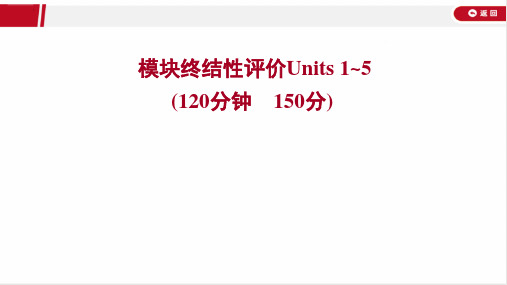
system.
W:That sounds great. ⑦I’ve got tons of CDs as well.They take up an entire wall of
my living room.
6.What does Lori Kool do?
A.A director.
B.A singer.
4.Which subject is the most difficult to the boy?
A.Math.
B.Chemistry.
C.Physics.
Text 5
M:May I borrow your bike? I’m going to the Forest Park.
W:It’ll take you a long time to get there by bike.
11.What does the woman do?
A.A teacher.
B.A student. C.A professor.
12.Why did the woman feel embarrassed last week?
A.She was late for the cookout.
B.She went to the wrong place.
Text 3 M:③I’ve just seen the X-rays and your teeth look just fine. W:I see.Then there is nothing to worry about after all. M:Yes.But you have to watch out when you play basketball next time. 3.What does the man do? A.A basketball player. B.A coach. C.A dentist.
人教版高中英语必修四 第二学期期末考试
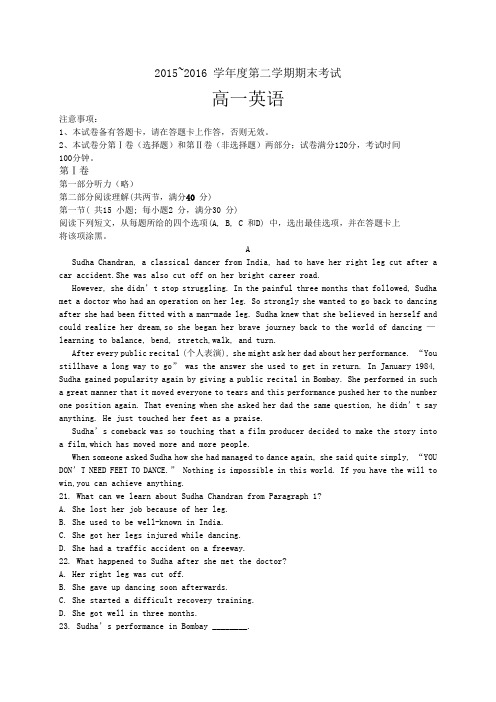
2015~2016 学年度第二学期期末考试高一英语注意事项:1、本试卷备有答题卡,请在答题卡上作答,否则无效。
2、本试卷分第Ⅰ卷(选择题)和第Ⅱ卷(非选择题)两部分;试卷满分120分,考试时间100分钟。
第Ⅰ卷第一部分听力(略)第二部分阅读理解(共两节,满分40 分)第一节( 共15 小题; 每小题2 分,满分30 分)阅读下列短文,从每题所给的四个选项(A, B, C 和D) 中,选出最佳选项,并在答题卡上将该项涂黑。
ASudha Chandran, a classical dancer from India, had to have her right leg cut after a car accident.She was also cut off on her bright career road.However, she didn’t stop struggling. In the painful three months that followed, Sudha met a doctor who had an operation on her leg. So strongly she wanted to go back to dancing after she had been fitted with a man-made leg. Sudha knew that she believed in herself and could realize her dream,so she began her brave journey back to the world of dancing —learning to balance, bend, stretch,walk, and turn.After every public recital (个人表演), she might ask her dad about her performance. “You stillhave a long way to go” was the answer she used to get in return. In January 1984, Sudha gained popularity again by giving a public recital in Bombay. She performed in such a great manner that it moved everyone to tears and this performance pushed her to the number one position again. That evening when she asked her dad the same question, he didn’t say anything. He just touched her feet as a praise.Sudha’s comeback was so touching that a film producer decided to make the story into a film,which has moved more and more people.When someone asked Sudha how she had managed to dance again, she said quite simply, “YOU DON’T NEED FEET TO DANCE.” Nothing is impossible in this world. If you have the will to win,you can achieve anything.21. What can we learn about Sudha Chandran from Paragraph 1?A. She lost her job because of her leg.B. She used to be well-known in India.C. She got her legs injured while dancing.D. She had a traffic accident on a freeway.22. What happened to Sudha after she met the doctor?A. Her right leg was cut off.B. She gave up dancing soon afterwards.C. She started a difficult recovery training.D. She got well in three months.23. Sudha’s performance in Bombay ________.A. was a great successB. attracted a great number of directorsC. was based on a filmD. was supported by a film producer24. What does the story tell us?A. Practice makes perfect.B. He who smiles last smiles best.C. Failure is the mother of success.D. Where there is a will, there is a way.BA Special Opportunity for Customers of Producers ChoiceDear music producers,If you LOVE producing music, then you are going to LOVE our new monthly sample (样品) pack club. With Producers Choice Monthly, you’ll get every single sample pack we’ll ever make at . You’ll get every new pack we put on the website — sent directly to your email inbox even before they go on our website! Also, you’ll get a new sample pack (worth $36) to get started immediately.Other Benefits:Only $29.95 per month.Cancel (取消) the order anytime you like.Get sample packs that NO ONE else will get.Keep your inspiration flowing with new samples each month.I’m excited to be able to offer this subscription (订购) service to both new and existing (存在的)customers. I hope you are looking forward to taking your music to the next level with our award-winning samples being sent to you each month — good for keeping your inspiration flowing.高一英语第3 页(共8 页)Frequently Asked Questions (FAQs) about Producers Choice Monthly:Q — How many sample packs will I get with my subscription?A — You’ll usually get 1—3 new sample packs per month. The sample packs are different insize, each of which is usually from 300MB to 2GB+, so you will get great value for money! Q — How will my samples be delivered to me?A — We send our members an email with a download link, so you can download your sample packs quickly and easily.Q — How does the payment/billing work?A — If you join our monthly plan, your credit card will be billed once a month. You can stop at any time.25. The website . is most probably for ________.A. music producersB. email writersC. credit card usersD. web designers26. How much will you pay if you subscribe to Producers Choice Monthly for half a year?A. $29.95.B. $36.C. $179.70.D. $149.75.27. What will you receive each month if you subscribe to Producers Choice Monthly?A. No less than three sample packs.B. A sample pack larger than 2GB.C. At least a sample pack of 300MB.D. Three sample packs larger that 6GB.28. How will you pay if you subscribe to Producers Choice Monthly?A. By bank card.B. By credit card.C. In cash.D. By check.CIn Los Angeles, drivers spend sixty-one hours every year stuck in traffic. These drivers know alltoo well how bad the traffic can be. “There’re too many cars, and you can’t move around a lot.”Professor Cyrus Shahabi also knows about traffic jams. He lives more than 65 kilometers fromhis office at the University of Southern California, in Los Angeles. He is always late even with thehelp of a navigation (导航) system.He decided to develop a program called ClearPath for that. He says his program uses historicaldata to predict traffic conditions even before the driver leaves the house. “What’s unique (独特的) isthat we use a lot of data that’s currently become available including traffic data, weather data, and we analyze that so that we can predict what’s going to happen in front of you when leave home.”Professor Shahabi says his system does more than just answer current traffic conditions. With ClearPath, he says, a driver can decide what time he wants to leave, and ClearPath will give thefastest route. It looks at the entire road network, including surface streets as well as highways, before the driver hits the road. Professor Shahabi hopes to have ClearPath available nationwide and overseas once they can collect traffic data from other cities.“I always thought that Los Angeles had the worst traffic, but now I know that Shanghai, Beijing,Seoul, Tokyo, believe it or not, Singapore, Hong Kong certainly are examples that can immediatelyuse this.”Professor Shahabi hopes to share this new technology with companies that already havenavigation systems, such as Google and Apple.29. Professor Cyrus Shahabi is often late for work because of ________.A. his living far awayB. his car’s navigation systemC. bad traffic conditionsD. too many cars in his university30. What is unique about ClearPath?A. It helps drivers know the road conditions ahead of time.B. It can make sure that you will never be late for work.C. It helps drivers see clearly what happens on the road.D. It can use a lot of information and data all over the world.31. The underlined word “ hits” in the fourth paragraph probably means ________.A. has accidentB. gets toC. turns left or rightD. collects traffic data32. What’s Professor Shahabi’s attitude toward his invention?A. Proud.B. Worried.C. Disappointed.D. Optimistic.DTeenagers at one German school are learning how to achieve happiness alongside other traditional subjects such as math and languages. The class sit in a circle with their eyes shut and they count from one to ten: someone starts, the next voice comes from the far right, a third from the other side.The aim of the game is to listen for an opportunity to shout out the number without clashing (冲突) with another voice or leaving a pause. On the first try, most of the young Germans try to be first, while a few are too shy to join in, but by the fifth time round, they develop a rhythm (节奏).The message: give other people space but also confidently claim your own. This is a requirement for social well-being.The Willy Hellpach School in Heidelberg is the first in the nation to develop a happiness course.It is intended for students preparing for university entrance exams.“The course isn’t there to make you happy,” Ernst Fritz-Schubert, the school principal, warned pupils, “but rather to help you discover the ways to become happy.”Cooking a meal together is one of the class exercises. Improving body language under the guidance of two professional actresses is another.The course is taught for three periods a week. Although it’s the happy subject, the pupils themselves insist it is no laughing matter.“In the first period, we had to each say something positive about another member of the class and about ourselves. No laughing at people,” said Fanny, 17.Research by the school shows it is not the first to start happiness classes: they also exist at some US universities, mainly based on positive thinking, using findings from studies of depression.33. What’s the writing purpose of this passage?A. To describe all the traditional courses.B. To introduce the happiness course.C. To develop the readers’ interest in happiness.D. To help students struggle against being sad.34. According to the passage, the happiness course is ________.A. created by the Willy Hellpach SchoolB. to make all the students happy all the timeC. required to be taken by the first year studentsD. to help students discover the way to happiness35. It can be inferred from the passage that ________.A. the students’ self-respect can also improve happinessB. the students just took the course as a laughing matterC. the students can certainly become happy after the courseD. the students waste time learning something without value第二节(共5 小题;每小题2 分,满分10 分)根据短文内容,从短文后的选项中选出能填入空白处的最佳选项。
人教版高中英语必修四高一下学期期末考试(英语) (3).docx
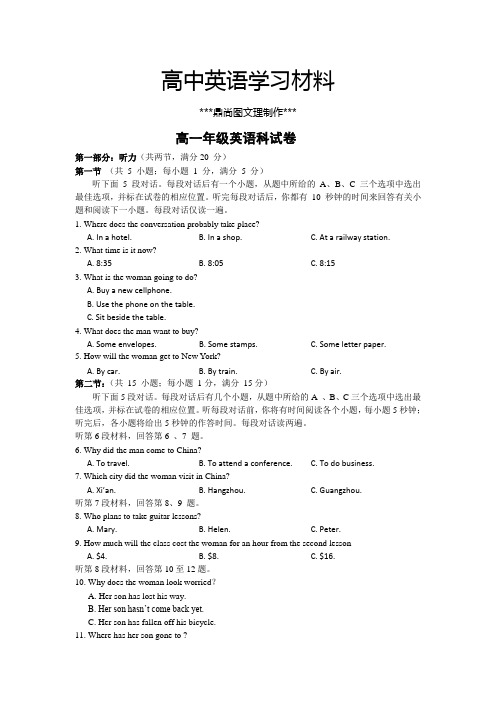
高中英语学习材料***鼎尚图文理制作***高一年级英语科试卷第一部分:听力(共两节,满分20 分)第一节(共 5 小题;每小题 1 分,满分5 分)听下面5 段对话。
每段对话后有一个小题,从题中所给的A、B、C 三个选项中选出最佳选项,并标在试卷的相应位置。
听完每段对话后,你都有10 秒钟的时间来回答有关小题和阅读下一小题。
每段对话仅读一遍。
1. Where does the conversation probably take place?A. In a hotel.B. In a shop.C. At a railway station.2. What time is it now?A. 8:35B. 8:05C. 8:153. What is the woman going to do?A. Buy a new cellphone.B. Use the phone on the table.C. Sit beside the table.4. What does the man want to buy?A. Some envelopes.B. Some stamps.C. Some letter paper.5. How will the woman get to New York?A. By car.B. By train.C. By air.第二节:(共15 小题;每小题1分,满分15分)听下面5段对话。
每段对话后有几个小题,从题中所给的A 、B、C三个选项中选出最佳选项,并标在试卷的相应位置。
听每段对话前,你将有时间阅读各个小题,每小题5秒钟;听完后,各小题将给出5秒钟的作答时间。
每段对话读两遍。
听第6段材料,回答第6 、7 题。
6. Why did the man come to China?A. To travel.B. To attend a conference.C. To do business.7. Which city did the woman visit in China?A. Xi’an.B. Hangzhou.C. Guangzhou.听第7段材料,回答第8、9 题。
人教版本高中英语必修四第二学期期末考试

高中英语学习资料madeofjingetieji福州八中2015—2016学年第二学期期末考试高一英语必修4考试时间:120分钟试卷满分:150分第一卷(满分100分)第一部分:听力(共20小题;每题分,满分30分)第一节听下边5段对话。
每段对话后有一个小题,从题中所给的A、B、C三个选项中选出最正确选项,并标在试卷的相应地点。
听完每段对话后,你都有10秒钟的时间来回答相关小题和阅读下一小题。
每段对话仅读一遍。
1.Wherewillthespeakersmeet?A.Atschool.B.Atarestaurant.C.Attheman’shouse.2.Atwhattimedoesthemeetingattheschoolbegin?A.5:50.B.6:00.C.6:15.3.Whatarethespeakerstalkingabout?A.Apaper.B.Aspeech.C.Ateacher.4.Whatwillthemandonext?A.Getthebook.B.Readinthelibrary.C.Readthenote.5.Whatisthewomangoingtobe?A.Adoctor.B.Ateacher.C.Aphotographer.第二节听下边5段对话或独白。
每段对话或独白后有几个小题,从题中所给的A、B、C三个选项中选出最正确选项,并标在试卷的相应地点。
听每段对话或独白前,你将有时间阅读各个小题,每题5秒钟;听完后,各小题给出5秒钟的作答时间。
每段对话或独白读两遍。
听第6段资料,回答第6、7题。
6.Whatkindofroomdoesthemanwanttobookforhisworkmate?A.Asingleroom.B.Adoubleroom.C.Aroomforthree.Whatdoesthewomansuggestthemando?Seeashow.Tryanotherhotel.Getintouchwithhisworkmate.听第7段资料,回答第8、9题。
人教版高中英语必修四期中期末试题及答案三套.doc
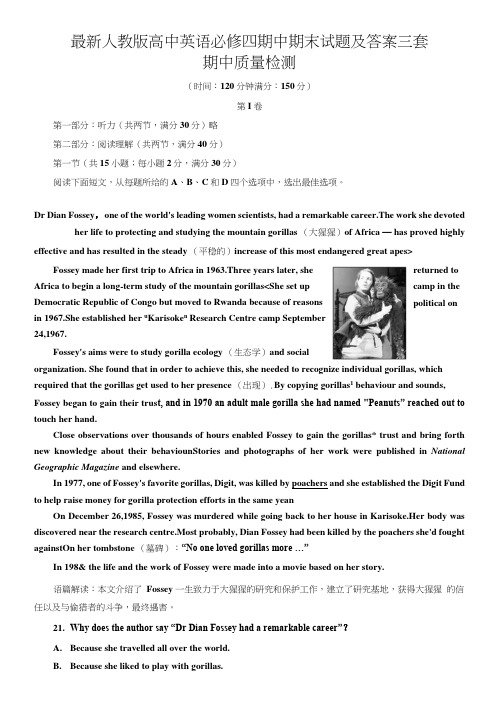
最新人教版高中英语必修四期中期末试题及答案三套期中质量检测(时间:120分钟满分:150分)第I 卷第一部分:听力(共两节,满分30分)略第二部分:阅读理解(共两节,满分40分)第一节(共15小题;每小题2分,满分30分)阅读下面短文,从每题所给的A 、B 、C 和D 四个选项中,选出最佳选项。
Dr Dian Fossey ,one of the world's leading women scientists, had a remarkable career.The work she devotedher life to protecting and studying the mountain gorillas (大猩猩)of Africa — has proved highly effective and has resulted in the steady (平稳的)increase of this most endangered great apes> Fossey made her first trip to Africa in 1963.Three years later, sheAfrica to begin a long-term study of the mountain gorillas<She set upDemocratic Republic of Congo but moved to Rwanda because of reasonsin 1967.She established her u Karisoke n Research Centre camp September24,1967.Fossey's aims were to study gorilla ecology (生态学)and socialorganization. She found that in order to achieve this, she needed to recognize individual gorillas, which required that the gorillas get used to her presence (出现).By copying gorillas 1 behaviour and sounds, Fossey began to gain their trus t, and in 1970 an adult male gorilla she had named "Peanuts” reached out to touch her hand.Close observations over thousands of hours enabled Fossey to gain the gorillas* trust and bring forth new knowledge about their behaviounStories and photographs of her work were published in National Geographic Magazine and elsewhere. In 1977, one of Fossey's favorite gorillas, Digit, was killed by poachers and she established the Digit Fund to help raise money for gorilla protection efforts in the same yeanOn December 26,1985, Fossey was murdered while going back to her house in Karisoke.Her body was discovered near the research centre.Most probably, Dian Fossey had been killed by the poachers she'd fought againstOn her tombstone (墓碑):“No one loved gorillas more …”In 198& the life and the work of Fossey were made into a movie based on her story.语篇解读:本文介绍了 Fossey 一生致力于大猩猩的研究和保护工作,建立了研究基地,获得大猩猩 的信任以及与偷猎者的斗争,最终遇害。
人教版高中英语必修四-高一第二学期期末考试.doc

高中英语学习材料***鼎尚图文理制作***徐闻一中2010-2011学年高一第二学期期末考试英语试题2011.7试题说明:本试卷分为选择题和非选择题两部分。
满分为150分,考试时间为120分钟。
注意事项:1、答卷前,考生务必用黑色字迹的钢笔或签字笔将自己的班级、姓名和考号填写在答题卡,并在答题卡上用2B铅笔将相应的信息点涂黑。
不按要求填涂的,答卷无效。
2、选择题每小题选出答案后,用2B铅笔把答题卡上对应题目的答案标号涂黑,如需改动,用橡皮擦干净后,再选涂其他答案,答案不能答在试卷上。
3、非选择题必须用黑色字迹钢笔或签字笔作答,答案必须写在答题卷各题目指定区域内的相应位置上;如需改动,先划掉原来的答案,然后再写上新的答案;不准使用铅笔和涂改液。
不按以上要求作答的答案无效。
第一部分:基础知识:(共20分)I.写出下列单词的变化形式:(每空0.5分,共10分)1.确定的,某一adj.._____________ 不确定的adj. _______________确定,肯定. adv. ____________ 确定的事,必然的事. n ___________2.危险n. ______________ 危险的adj. ______________危害,危及v.___________________ 受到危害的,濒危的adj. _______________3. 邀请v. ________________ 邀请,招待n. ________________诱人的adj. ___________ 诱人地adv. ___________4.社会n. . ______________ 社会的adj. _______________社会主义n. __________ 社会主义者n.__________________5. 好奇心n. ____________ 好奇的adj. ____________好奇地adv. ___________II.用所给单词的适当形式完成句子:(每空1分,共10分)6. He considered that the change would be _______________ to his health. ( benefit )7. You are not ______________ to leave here without his _____________ . ( permit )8. You’d better _____________ to Jimmy. Of course, making _____________ is not the only way but the most direct one. ( apologize )9. Peter had thought the boss was ___________, but he was ____________ and he fired Peter without ______________. ( mercy )10. She is too ___________ towards her children; her _____________ has limited their development. ( protect )第二部分:语言知识及应用(共两节,满分45分)第一节:完形填空(共15小题;每小题2分,满分30分)阅读下面的短文,掌握其大意,然后从11--25各题所给的A、B、C和D项中,选出最佳选项。
人教版高中英语必修四(下)高一英语期末测试题
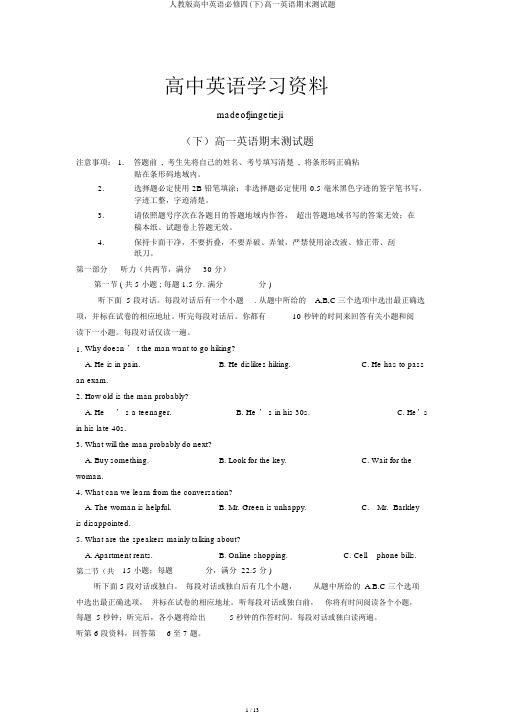
高中英语学习资料madeofjingetieji(下)高一英语期末测试题注意事项: 1.答题前,考生先将自己的姓名、考号填写清楚,将条形码正确粘贴在条形码地域内。
2.选择题必定使用 2B 铅笔填涂;非选择题必定使用 0.5 毫米黑色字迹的签字笔书写,字迹工整,字迹清楚。
3.请依照题号序次在各题目的答题地域内作答,超出答题地域书写的答案无效;在稿本纸、试题卷上答题无效。
4.保持卡面干净,不要折叠,不要弄破、弄皱,严禁使用涂改液、修正带、刮纸刀。
第一部分听力(共两节,满分30 分)第一节 ( 共 5 小题 ; 每题 1.5 分. 满分分 )听下面 5 段对话。
每段对话后有一个小题. 从题中所给的A,B,C 三个选项中选出最正确选项,并标在试卷的相应地址。
听完每段对话后。
你都有10 秒钟的时间来回答有关小题和阅读下一小题。
每段对话仅读一遍。
1.Why doesn ’ t the man want to go hiking?A. He is in pain.B. He dislikes hiking.C. He has to pass an exam.2.How old is the man probably?A. He’ s a teenager.B. He ’ s in his 30s.C. He’s in his late 40s.3.What will the man probably do next?A. Buy something.B. Look for the key.C. Wait for the woman.4.What can we learn from the conversation?A. The woman is helpful.B. Mr. Green is unhappy.C.Mr. Barkley is disappointed.5.What are the speakers mainly talking about?A. Apartment rents.B. Online shopping.C. Cell phone bills.第二节(共15 小题;每题分,满分 22.5 分 )听下面 5 段对话或独白。
人教版高中英语必修四高一下学期英语期末考试.docx
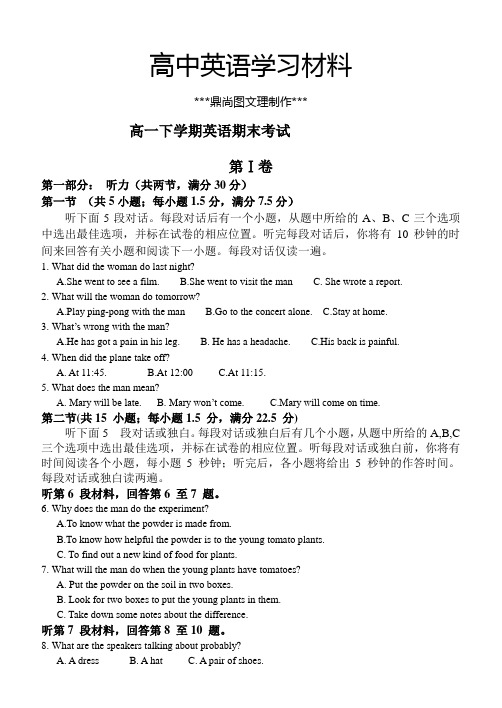
高中英语学习材料***鼎尚图文理制作***高一下学期英语期末考试第Ⅰ卷第一部分:听力(共两节,满分30分)第一节(共5小题;每小题1.5分,满分7.5分)听下面5段对话。
每段对话后有一个小题,从题中所给的A、B、C三个选项中选出最佳选项,并标在试卷的相应位置。
听完每段对话后,你将有10秒钟的时间来回答有关小题和阅读下一小题。
每段对话仅读一遍。
1.What did the woman do last night?A.She went to see a film.B.She went to visit the manC. She wrote a report.2.What will the woman do tomorrow?A.Play ping-pong with the manB.Go to the concert alone.C.Stay at home.3.What’s wrong with the man?A.He has got a pain in his leg.B. He has a headache.C.His back is painful.4.When did the plane take off?A. At 11:45.B.At 12:00C.At 11:15.5.What does the man mean?A. Mary will be late.B. Mary won’t come.C.Mary will come on time.第二节(共15 小题;每小题1.5 分,满分22.5 分)听下面5 段对话或独白。
每段对话或独白后有几个小题,从题中所给的A,B,C 三个选项中选出最佳选项,并标在试卷的相应位置。
听每段对话或独白前,你将有时间阅读各个小题,每小题5 秒钟;听完后,各小题将给出5 秒钟的作答时间。
每段对话或独白读两遍。
听第6 段材料,回答第6 至7 题。
6.Why does the man do the experiment?A.To know what the powder is made from.B.To know how helpful the powder is to the young tomato plants.C. To find out a new kind of food for plants.7.What will the man do when the young plants have tomatoes?A. Put the powder on the soil in two boxes.B. Look for two boxes to put the young plants in them.C. Take down some notes about the difference.听第7 段材料,回答第8 至10 题。
人教版本高中英语必修四高中高一下学期期末考试英语
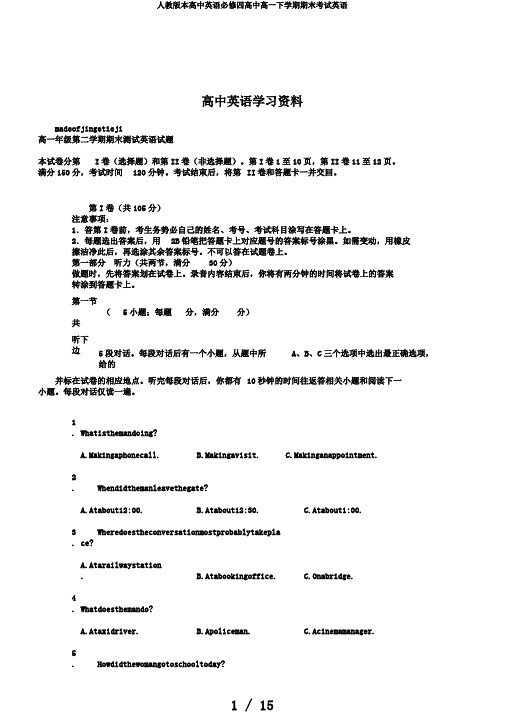
高中英语学习资料madeofjingetieji高一年级第二学期期末测试英语试题本试卷分第I卷(选择题)和第II卷(非选择题)。
第I卷1至10页,第II卷11至12页。
满分150分,考试时间120分钟。
考试结束后,将第II卷和答题卡一并交回。
第I卷(共105分)注意事项:1.答第I卷前,考生务势必自己的姓名、考号、考试科目涂写在答题卡上。
2.每题选出答案后,用2B铅笔把答题卡上对应题号的答案标号涂黑。
如需变动,用橡皮擦洁净此后,再选涂其余答案标号。
不可以答在试题卷上。
第一部分听力(共两节,满分30分)做题时,先将答案划在试卷上。
录音内容结束后,你将有两分钟的时间将试卷上的答案转涂到答题卡上。
第一节(共5小题;每题分,满分分)听下边5段对话。
每段对话后有一个小题,从题中所给的A、B、C三个选项中选出最正确选项,并标在试卷的相应地点。
听完每段对话后,你都有10秒钟的时间往返答相关小题和阅读下一小题。
每段对话仅读一遍。
1.Whatisthemandoing?A.Makingaphonecall.B.Makingavisit.C.Makinganappointment.2.Whendidthemanleavethegate?A.Atabout12:00.B.Atabout12:30.C.Atabout1:00.3 .Wheredoestheconversationmostprobablytakeplace?A.Atarailwaystation. B.Atabookingoffice. C.Onabridge.4.Whatdoesthemando?A.Ataxidriver.B.Apoliceman.C.Acinemamanager.5.Howdidthewomangotoschooltoday?A.Bybike.B.Bybus.C.Onfoot.第二节(共15小题;每题分,满分分)听下边5段对话或独白。
人教版高中英语必修四第二学期高一期末英语试题.docx
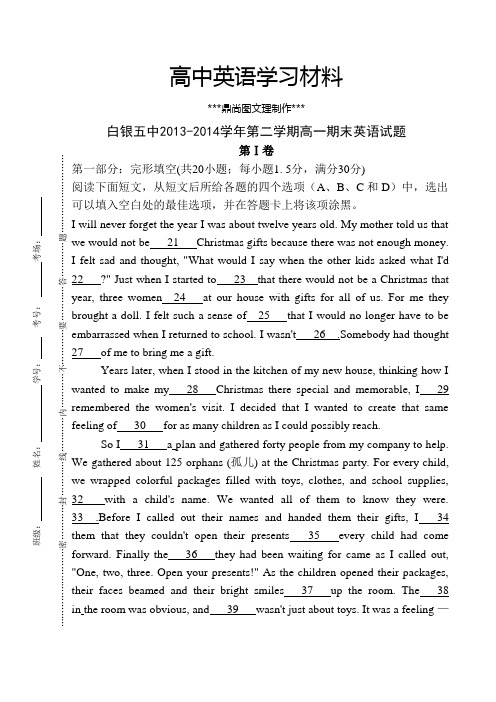
高中英语学习材料***鼎尚图文理制作***白银五中2013-2014学年第二学期高一期末英语试题第Ⅰ卷 第一部分:完形填空(共20小题;每小题1. 5分,满分30分) 阅读下面短文,从短文后所给各题的四个选项(A 、B 、C 和D )中,选出可以填入空白处的最佳选项,并在答题卡上将该项涂黑。
I will never forget the year I was about twelve years old. My mother told us that we would not be 21 Christmas gifts because there was not enough money. I felt sad and thought, "What would I say when the other kids asked what I'd 22 ?" Just when I started to 23 that there would not be a Christmas that year, three women 24 at our house with gifts for all of us. For me they brought a doll. I felt such a sense of 25 that I would no longer have to be embarrassed when I returned to school. I wasn't 26 .Somebody had thought 27 of me to bring me a gift. Years later, when I stood in the kitchen of my new house, thinking how I wanted to make my 28 Christmas there special and memorable, I 29 remembered the women's visit. I decided that I wanted to create that same feeling of 30 for as many children as I could possibly reach. So I 31 a plan and gathered forty people from my company to help. We gathered about 125 orphans (孤儿) at the Christmas party. For every child, we wrapped colorful packages filled with toys, clothes, and school supplies, 32 with a child's name. We wanted all of them to know they were. 33 .Before I called out their names and handed them their gifts, I 34 them that they couldn't open their presents 35 every child had come forward. Finally the 36 they had been waiting for came as I called out, "One, two, three. Open your presents!" As the children opened their packages, their faces beamed and their bright smiles 37 up the room. The 38 in the room was obvious, and 39 wasn't just about toys. It was a feeling — 班级: 姓名: 学号: 考号: 考场:………………………密…………封…………线…………内…………不…………要…………答…………题………………………the feeling I knew 40 that Christmas so long ago when the women came to visit. I wasn't forgotten. Somebody thought of me. I matter.21. A. sending B. receiving C. making D. exchanging22. A. found B. prepared C. got D. expected23. A. doubt B. hope C. suggest D. accept24. A. broke in B. settled down C. turned up D. showed off25. A. relief B. loss C. achievement D. justice26. A. blamed B. loved C. forgotten D. affected27. A. highly B. little C. poorly D. enough28. A. present B. first C.. recent D. previous29. A. hardly B. instantly C. regularly D. occasionally30. A. strength B. independence C. importance D. safety31. A. kept up with B. caught up with C. came up with D. put up with32. A. none B. few C. some D. each33. A. fine B. special C. helpful D. normal34. A. reminded B. guaranteed C. convinced D. promised35. A. after B. until C. when 。
XX-XX高中英语必修4期末测试题(人教版含答案)
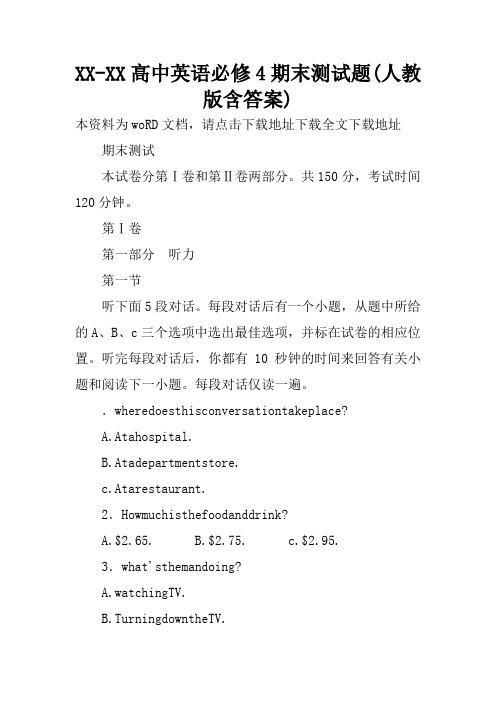
XX-XX高中英语必修4期末测试题(人教版含答案)本资料为woRD文档,请点击下载地址下载全文下载地址期末测试本试卷分第Ⅰ卷和第Ⅱ卷两部分。
共150分,考试时间120分钟。
第Ⅰ卷第一部分听力第一节听下面5段对话。
每段对话后有一个小题,从题中所给的A、B、c三个选项中选出最佳选项,并标在试卷的相应位置。
听完每段对话后,你都有10秒钟的时间来回答有关小题和阅读下一小题。
每段对话仅读一遍。
.wheredoesthisconversationtakeplace?A.Atahospital.B.Atadepartmentstore.c.Atarestaurant.2.Howmuchisthefoodanddrink?A.$2.65.B.$2.75. c.$2.95.3.what'sthemandoing?A.watchingTV.B.TurningdowntheTV.c.Answeringthephone.4.Accordingtotheman,whatdoesheliketodoifpossible?A.Tovisitmuseums.B.Tomakeagoodplan.c.Tovisitthemodernmuseum.5.whatnewsdidthewomangetfromtheman?A.SamwillleaveNewyorkverysoon.B.Sam'ssisterwillleaveforLosAngelesverysoon.c.Sam'ssisterwillleaveforNewyorkverysoon.第二节听下面5段对话或独白。
每段对话或独白后有几个小题,从题中所给的A、B、c三个选项中选出最佳选项,并标在试卷的相应位置。
听每段对话或独白前,你将有时间阅读各个小题,每小题5秒钟;听完后,各小题将给出5秒钟的作答时间。
每段对话或独白读两遍。
听第6段材料,回答第6~7题。
必修4英语期末试题及答案
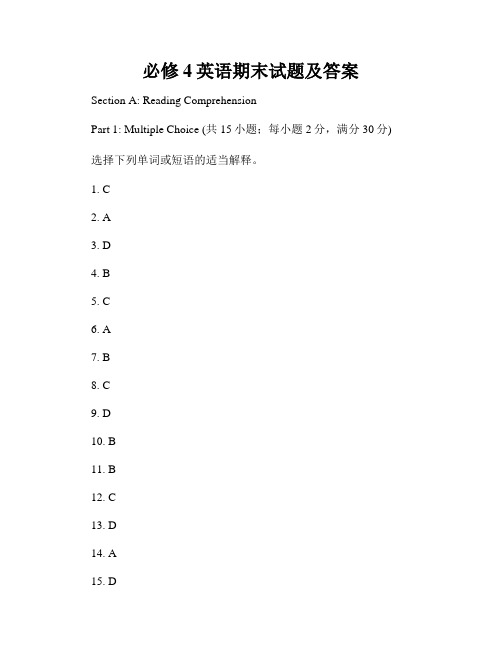
必修4英语期末试题及答案Section A: Reading ComprehensionPart 1: Multiple Choice (共15小题;每小题2分,满分30分)选择下列单词或短语的适当解释。
1. C2. A3. D4. B5. C6. A7. B8. C9. D10. B11. B12. C13. D14. A15. DPart 2: True or False (共10小题;每小题2分,满分20分)判断下列句子是否符合短文内容,符合的写“T”,不符合的写“F”。
16. T17. T18. F19. T20. F21. T22. F23. T24. F25. FPart 3: Reading Comprehension (共2篇短文;每小题2分,满分40分)阅读下面两篇短文,从每题所给的四个选项(A、B、C和D)中选出最佳选项。
Passage 1:26. D27. B28. C29. D30. A31. C32. B33. A34. D35. B Passage 2:36. A37. C38. D39. B40. A41. C42. D43. B44. A45. CSection B: WritingPart 1: Rewrite the Sentences (共5小题;每小题2分,满分10分)根据括号中的要求,改写句子。
每个空格限填一词。
46. I have learned Chinese for three years. (改为否定句)I haven't learned Chinese for three years.47. He prefers swimming to jogging. (改为同义句)He likes swimming better than jogging.48. I forgot to bring my umbrella, so I got wet in the rain. (合并为一句)Forgetting to bring my umbrella, I got wet in the rain.49. The laptop costs me $800. (改为同义句)I paid $800 for the laptop.50. It is not a good idea to leave your keys under the doormat. (改为同义句)Leaving your keys under the doormat is a bad idea.Part 2: Guided Writing (共1题;满分15分)请根据以下提示内容,结合自己的生活经历,用英语写一篇短文。
人教版高中英语必修四期末测试题.doc
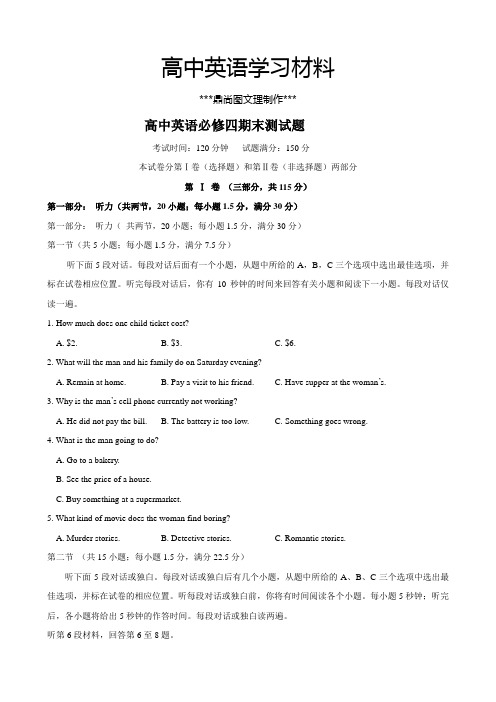
高中英语学习材料***鼎尚图文理制作***高中英语必修四期末测试题考试时间:120分钟试题满分:150分本试卷分第Ⅰ卷(选择题)和第Ⅱ卷(非选择题)两部分第Ⅰ卷(三部分,共115分)第一部分:听力(共两节,20小题;每小题1.5分,满分30分)第一部分:听力(共两节,20小题;每小题1.5分,满分30分)第一节(共5小题;每小题1.5分,满分7.5分)听下面5段对话。
每段对话后面有一个小题,从题中所给的A,B,C三个选项中选出最佳选项,并标在试卷相应位置。
听完每段对话后,你有10秒钟的时间来回答有关小题和阅读下一小题。
每段对话仅读一遍。
1. How much does one child ticket cost?A. $2.B. $3.C. $6.2. What will the man and his family do on Saturday evening?A. Remain at home.B. Pay a visit to his friend.C. Have supper at the woman’s.3. Why is the man’s cell phone currently not working?A. He did not pay the bill.B. The battery is too low.C. Something goes wrong.4. What is the man going to do?A. Go to a bakery.B. See the price of a house.C. Buy something at a supermarket.5. What kind of movie does the woman find boring?A. Murder stories.B. Detective stories.C. Romantic stories.第二节(共15小题;每小题1.5分,满分22.5分)听下面5段对话或独白。
人教版高中英语必修四高一下学期期末考试英语试题
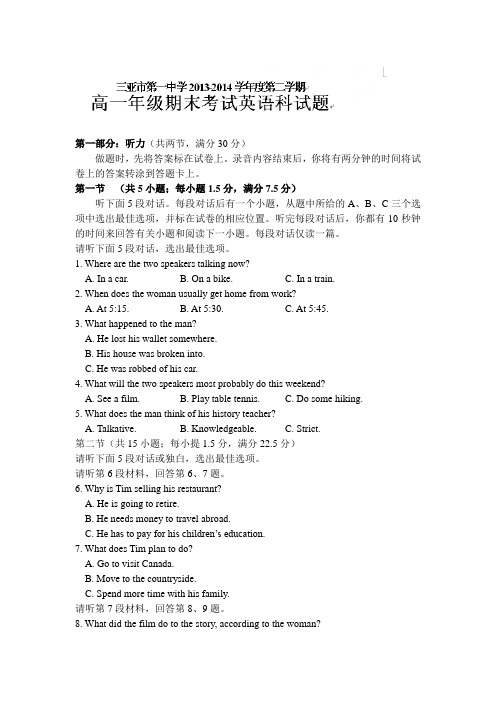
第一部分:听力(共两节,满分30分)做题时,先将答案标在试卷上。
录音内容结束后,你将有两分钟的时间将试卷上的答案转涂到答题卡上。
第一节(共5小题;每小题1.5分,满分7.5分)听下面5段对话。
每段对话后有一个小题,从题中所给的A、B、C三个选项中选出最佳选项,并标在试卷的相应位置。
听完每段对话后,你都有10秒钟的时间来回答有关小题和阅读下一小题。
每段对话仅读一篇。
请听下面5段对话,选出最佳选项。
1. Where are the two speakers talking now?A. In a car.B. On a bike.C. In a train.2. When does the woman usually get home from work?A. At 5:15.B. At 5:30.C. At 5:45.3. What happened to the man?A. He lost his wallet somewhere.B. His house was broken into.C. He was robbed of his car.4. What will the two speakers most probably do this weekend?A. See a film.B. Play table tennis.C. Do some hiking.5. What does the man think of his history teacher?A. Talkative.B. Knowledgeable.C. Strict.第二节(共15小题;每小提1.5分,满分22.5分)请听下面5段对话或独白,选出最佳选项。
请听第6段材料,回答第6、7题。
6. Why is Tim selling his restaurant?A. He is going to retire.B. He needs money to travel abroad.C. He has to pay for his children’s education.7. What does Tim plan to do?A. Go to visit Canada.B. Move to the countryside.C. Spend more time with his family.请听第7段材料,回答第8、9题。
人教版高中英语必修四下学期期末考试 (4).docx

高中英语学习材料***鼎尚图文理制作***2015~2016学年度下学期期末考试高一英语试卷考试时间120分钟试题分数 150 命题人于波第一部分:听力第一节1.Whose wallet probably is it?A. the woman’sB. The man’sC. Gina’s2. What is the date today?A. May 1stB. May 2ndC. May 3rd3. Who made the woman’s personal web page?A. She herselfB. Her friend.C. The man4. What are the speakers mainly talking about?A. A townB. An accidentC. A murder5. What is the probable relationship between the speakers?A. Relatives.B. Colleagues.C. Neighbors.第二节(共15小题;每小题1.5分,满分22.5分)6. What is the man doing?A. Watching TVB. Listening to the radio.C. Reading the newspaper7. Why are the rich and famous targets for being talked about according to the man?A. The public are interested in them.B. The public want to laugh at them.C. The public want to make them famous.听第7段材料,回答第8-10题。
8. Why does the man look sad? A. He had to stop his study. B. He failed his test again.C. He couldn’t understand the foreigners.9. How did the woman improve her French?A. By reading French newspapersB. By watching French films.C. By speaking to herself.10. What does the woman suggest the man do?A. Be confident.B. Talk with foreignersC. Ask the teacher for advice.听第8段材料,回答第11至13题。
- 1、下载文档前请自行甄别文档内容的完整性,平台不提供额外的编辑、内容补充、找答案等附加服务。
- 2、"仅部分预览"的文档,不可在线预览部分如存在完整性等问题,可反馈申请退款(可完整预览的文档不适用该条件!)。
- 3、如文档侵犯您的权益,请联系客服反馈,我们会尽快为您处理(人工客服工作时间:9:00-18:30)。
高中英语学习材料***鼎尚图文理制作***兰州一中2015-2016-2学期期末考试试题高一英语说明:本试题分为第I卷(选择题)和第II卷(非选择题)两部分。
满分100分,考试时间为100分钟。
答案写在答题卡上,交卷时只交答题卡。
第I卷(选择题)第一部分:阅读理解(共两节,满分30分)第一节(共10小题;每小题2分,满分20分)阅读下列短文,从每题所给的四个选项(A、B、C和D)中,选出最佳选项。
AAs we all know, people redecorate their hotels regularly. However, very few do it as frequently as Sweden’s Icehotel. As the name indicates, the hotel that is located in the remote village of Jukkasjarvi, is built entirely from ice and, therefore, has to be rebuilt annually! The 26th version of Icehotel, which welcomed its first visitors on December 11th,features 69 rooms. To make them affordable for everyone, they range from expensive luxury suites to basic accommodations.Among this year’s un ique suite offerings is the “Elephant in the Room”,which features a massive 3-m tall sculpted African elephant overlooking an ice-framed bed. The “Counting Sheep” suite features frozen sheep that may help those who don’t sleep well get a good night’s rest. Though the atmosphere between the luxury suites and the budget rooms may differ, they are all subject to the bone-chilling-5℃temperatures. To get a good night’s rest guests have to lie inside sleeping bags and keep their gloves and hats on. Though that seems a little uncomfortable, visitors say it is an experience like none other.The hotel also features a beautifully crafted ice church where over 100 couples will get married this year and an Ice Bar that will serve drinks in ice glasses. Though dining options are limited to the hotel’s only restaurant, guests will have little to complain about with Michelin—trained chef Alexander Meier. To keep customers entertained, the hotel offers a variety of fun activities like snowshoeing, moose or snowmobile safaris, dog sledding, and even overnight wilderness camping.The 26-year-·old tradition began accidentally in 1989 when locals organized an art exhibition to draw winter visitors to the remote village that lies 200 km north of the Arctic Circle.Among the many tourists was an adventurous group and they announced their intention of spending the night in the place where the exhibition was being held.That’s when the idea of building the icy accommodations dawned on the locals.1. Why is Sweden’s Icehotel rebuilt ev ery year?A. It needs more rooms.B. It is entirely built from ice.C. It follows old traditions.D. It can be easily decorated.2. What is unique about the hotel this year?A. It opens earlier than ever before.B. More expensive rooms are available.C. Room prices are more affordable.D. Some rooms have theme sculptures.3. What can be inferred about the hotel in Paragraph 3?A. Its service needs improving.B. Its activities may be boring.C. It tries to attract more customers.D. Its food is not delicious at a1l.BAccording to the latest survey by the Asian Development Bank, Asian parents are spending billions of dollars on private tutors (家庭教师) for their children and the practice is growing despite doubts about its effectiveness.“Shadow education” is an expanding business not only in wealthy countries, but also in some of t he region’s poorer nations as parents try to give their children the best start in life, the study said. Nearly nine out of 10 South Korean elementary pupils receive private tutoring, while the figure for primary school children in India’s West Bengal stat e stands at six out of 10.The study estimated that the costs of private tutoring in South Korea were equivalent (相等的) to 80 percent of government spending on public education. Japan spent $12 billion on extra teaching in 2011, while the figure for Singapore stood at US$ 680 million in 2009.Extra academic work aims to help slow learners and support high achievers. Many Asian parents view it as a constructive way for adolescents to spend their spare time. However, it can also reduce the students’ time for s ports and other activities important for their overall development as well as cause social tensions as richer families are able to pay for better-quality tutoring, the study said.The study calls for a review of educational systems to make such extra teaching less attractive.4. Why is “Shadow education" an expanding business?A. Because parents want to spend their money.B. Because children don't want to go to school.C. Because parents want their children to stay with teachers.D. Because parents want to give their children the best start in life.5. According to the article, what is the purpose of extra academic work?A. To aid slow learners and support high achievers.B. To prepare children for all kinds of academic contests.C. To increase children's hobbies and interests in many fields.D. To gain the most knowledge students can't get in class.6. Which disadvantage of extra academic work is NOT mentioned?A. Causing social tensions.B. Spending more extra money.C. Lacking the chance to communicate with others.D. Reducing the students’ time for sports and other activities.7. What is the text mainly about?A. The government policy on educational systems.B. How to provide the best education for children.C. The importance for children's overall development.D. The reasons for the popularity of private tutors for children.CEtymology, the study of words and word roots, may sound like the kind of thing done by boring librarians in small, dusty rooms. Yet etymologists actually have a uniquely interesting job. They are in many ways just like archaeologists (考古学家) digging up the physical history of people and events. The special aspect of etymology is that it digs up history, so to speak, through the words and phrases that are left behind.The English language, in particular, is a great field to explore history through words. As a language, English has an extraordinary number of words. This is partly due to its ability to adapt foreign words so readily. For example, “English” words such as kindergarten (from German), croissant (from French), and cheetah (from Hindi) have become part of the language with little or no change from their original sounds and spellings. So English-language etymologists have a vast world of words to explore.Another enjoyable thing about etymology for most word experts is solving word mysteries (谜). No, etymologists do not go around solving murders, like the great detective Sherlock Holmes. What these word experts solve are mysterious origins of some of our most common words.One of the biggest questions English language experts have pursued is how English came to have the phrase OK. Though it is one of the most commonly used expressions, its exact beginning is a puzzle even to this day. Even its spelling is not entirely consistent--unless you spell it Okay, it is hard even to call it a word.Etymologists have been able to narrow OK’s origin down to a likely, although not certain, source (来源). It became widely used around the time of Martin Van Buren’s run for presiden t in 1840. His nickname was Old Kinderhook. What troubles word experts about this explanation is that the phrase appeared in some newspapers before Van Buren became well known. It is likely that Van Buren could be called its primary source. Etymologists will doubtlessly keep searching for the original source. However, it is clear that OK’s popularity and reputation have topped those of the American president to whom it has been most clearly linked.8. The author mentions the words like “croissant” in Paragr aph 2 to show _______.A. words have changed a lot in the two languagesB. what English-language etymologists are exploring nowC. English has absorbed many words from other foreign languagesD. the English vocabulary is difficult to the non-English-speaking people9. The underlined word “pursued” in Paragraph 4 means _______.A. looked uponB. dug upC. put inD. set down10. We can learn from the passage that etymologists _______.A. discover the possible origin of wordsB. help detectives to solve mysterious murdersC. write interesting stories for some newspapersD. explore the English language as well as the recent events第二节(本节共5小题;每小题2分,共10分)根据短文内容,从短文后的选项中选出能填入空白处的最佳选项。
